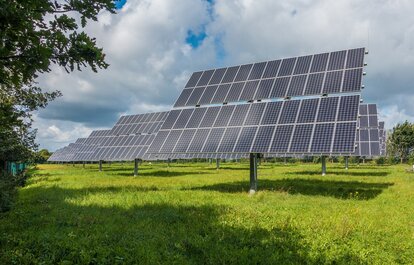Mediterranean Dialogue
2023: Crisis on the Mediterranean horizon

The global economy continues to face the challenges of the war in Europe. According to the International Monetary Fund (IMF), the World Bank (WB), the Organisation for Economic Cooperation and Development (OECD) and other international organisations, the consequences of the war are predicting a complex economic outlook for 2023.
The generalised contraction of the economy also extends to the Mediterranean basin, albeit in a very disparate manner, highlighting the limits of the European energy ecosystem.
Thus, the global report, issued in October 2022 by the IMF, indicates an economic slowdown of 2.7% for 2023, which could even end up below 2%. The big economies, the US, the euro zone and, to a lesser extent, China, are affected. The IMF forecasts a growth of 1%, 0.5% and 4.4% respectively.
It is true that the easing of geopolitical pressure from gas, thanks to the accumulation of hydrocarbons and the rise in interest rates, had succeeded in calming the inflationary wave by the end of 2022. But not its underlying component, which does not take energy and fresh food into account. And it is, moreover, the one that is most worrying and that continues to rise in the main economies on both sides of the Atlantic and the Mediterranean.
If the Chinese downturn is blamed on confinements and a real estate sector experiencing a free fall, in the US, Europe and other emerging economies it is due to the restrictive monetary policy undertaken in 2022. A cycle that has ended up cooling the world economy, leaving behind major deficits and an excessive rate of indebtedness, aggravated by a rising dollar.
Thus, Italy's debt is 150% of Gross Domestic Product (GDP), France's is 114% and Spain's is close to 120%. In the case of Greece, although it has emerged from strict financial surveillance by the European Commission, its debt is close to 180% of GDP and endangers its development.
Turkey's monetary policy is very surprising. In contrast to economic orthodoxy, it favours interest rate cuts and substantial wage hikes. As a result, second-round inflation reached 84.4% in November before falling back to 64.3% last December.

A more moderate picture is emerging in the Mediterranean Maghreb, where Tunisia is emerging as a high-risk country due to its level of indebtedness, which exceeds 100% of GDP. Moreover, it has serious difficulties in financing its deficit and negotiations with the IMF are not progressing. A worrying political, economic and financial scenario that threatens the country's fragile social peace. Meanwhile in Morocco, according to the latest revised data attached to the new budget law for 2023, the debt stands at 62%. Algeria's debt is close to 65%.
In this geo-economic environment, the economic outlook is mixed. More specifically, the European shore of the Mediterranean area shows a decrease ranging from -0.2 in Italy, which is practically in recession in 2023, to 3% in Turkey. Spain with 1.2% and France would reach 0.7%. The northern shore thus records a very poor average of only 1.3%, after having achieved encouraging growth in 2022.
In contrast, the Mediterranean Maghreb, where two of its countries are hydrocarbon exporters, shows an average recovery of 10.88%. Libya stands out with a growth forecast of 17.9%. This confirms the recovery of energy activity in a divided country with large oil reserves. In second place comes Morocco with a rate of 3.1% and Algeria with 2.6%. Tunisia has the lowest rate, 1.6%.
Beyond the Maghreb, Egypt's economic forecast is estimated at 4.4% and a debt-to-GDP ratio of close to 90%. Israel, on the other hand, is expected to grow by only 3%, having grown by 2022, like Egypt, by more than 6%, with debt accounting for 60% of GDP. It should be noted that both countries are gas exporters.
In 2022, gas supply difficulties were alleviated with large stocks through distant purchases, albeit at high prices. It is very likely that the pessimism of the IMF and other organisations is rooted in the question of how the price of gas and electricity will be managed in 2023. This uncertainty could justify forecasts that are well below Europe's economic potential. In fact, average growth on the southern shore of the Mediterranean far exceeds that of the northern shore.

The war is being fought in Europe. A conflict that looks set to continue beyond 2023. And Putin, weakened and in economic recession (-3.4 in 2022 and -2.3 by 2023), is aware that he will not win it by conventional means, where the North Atlantic Treaty Organisation (NATO) is very active materially and intelligently.
The IMF's pessimism also hints at further rate hikes in the course of 2023, mainly by the Fed and the European Central Bank (ECB). At the same time, there is a risk that fiscal compensation for companies and households will disappear. This public intervention has been alleviating both the high cost of living over the last year and calming the disturbance of social peace.
The countries on the southern shores of the Mediterranean, which are less exposed to the vagaries of war, are mostly gas exporters, such as Libya, Egypt and Algeria. Morocco, where significant gas reserves have already been announced, is implementing a green economy based on the production and consumption of renewables.
And, of course, the prolongation of the war, the source of all evils, could normalise a certain, manageable level of inflation. Europe's difficult dependence on fossil fuels remains to be resolved.
In view of the geopolitical and ecological stresses facing humanity, this energy and, consequently, economic crisis must be translated into a definitive transition to green energies and economies.
